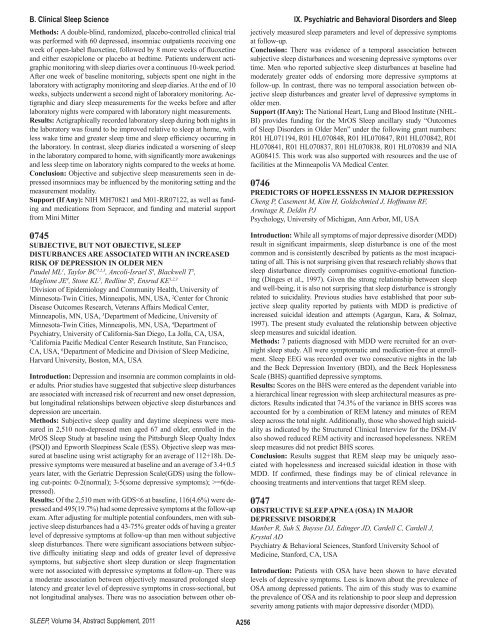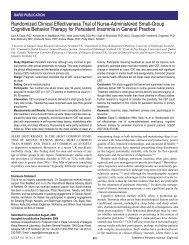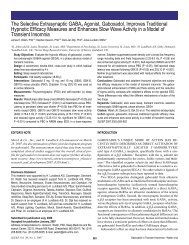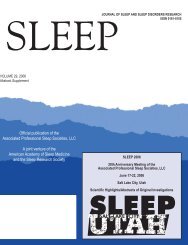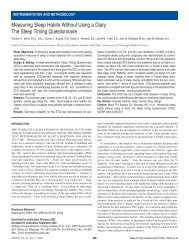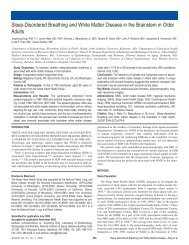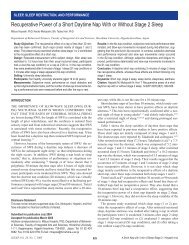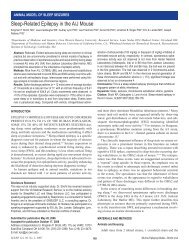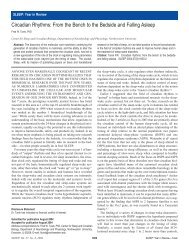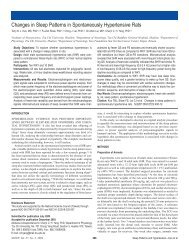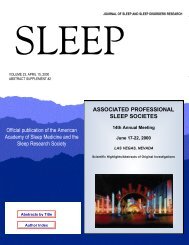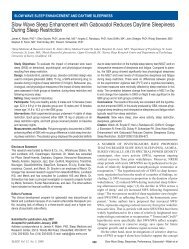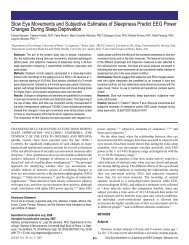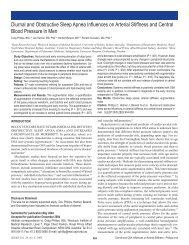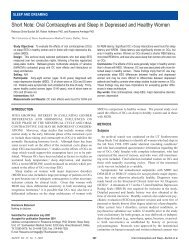SLEEP 2011 Abstract Supplement
SLEEP 2011 Abstract Supplement
SLEEP 2011 Abstract Supplement
You also want an ePaper? Increase the reach of your titles
YUMPU automatically turns print PDFs into web optimized ePapers that Google loves.
B. Clinical Sleep Science IX. Psychiatric and Behavioral Disorders and Sleep<br />
Methods: A double-blind, randomized, placebo-controlled clinical trial<br />
was performed with 60 depressed, insomniac outpatients receiving one<br />
week of open-label fluoxetine, followed by 8 more weeks of fluoxetine<br />
and either eszopiclone or placebo at bedtime. Patients underwent actigraphic<br />
monitoring with sleep diaries over a continuous 10-week period.<br />
After one week of baseline monitoring, subjects spent one night in the<br />
laboratory with actigraphy monitoring and sleep diaries. At the end of 10<br />
weeks, subjects underwent a second night of laboratory monitoring. Actigraphic<br />
and diary sleep measurements for the weeks before and after<br />
laboratory nights were compared with laboratory night measurements.<br />
Results: Actigraphically recorded laboratory sleep during both nights in<br />
the laboratory was found to be improved relative to sleep at home, with<br />
less wake time and greater sleep time and sleep efficiency occurring in<br />
the laboratory. In contrast, sleep diaries indicated a worsening of sleep<br />
in the laboratory compared to home, with significantly more awakenings<br />
and less sleep time on laboratory nights compared to the weeks at home.<br />
Conclusion: Objective and subjective sleep measurements seen in depressed<br />
insomniacs may be influenced by the monitoring setting and the<br />
measurement modality.<br />
Support (If Any): NIH MH70821 and M01-RR07122, as well as funding<br />
and medications from Sepracor, and funding and material support<br />
from Mini Mitter<br />
0745<br />
SUBJECTIVE, BUT NOT OBJECTIVE, <strong>SLEEP</strong><br />
DISTURBANCES ARE ASSOCIATED WITH AN INCREASED<br />
RISK OF DEPRESSION IN OLDER MEN<br />
Paudel ML 1 , Taylor BC 1,2,3 , Ancoli-Israel S 4 , Blackwell T 5 ,<br />
Maglione JE 4 , Stone KL 5 , Redline S 6 , Ensrud KE 1,2,3<br />
1<br />
Division of Epidemiology and Community Health, University of<br />
Minnesota-Twin Cities, Minneapolis, MN, USA, 2 Center for Chronic<br />
Disease Outcomes Research, Veterans Affairs Medical Center,<br />
Minneapolis, MN, USA, 3 Department of Medicine, University of<br />
Minnesota-Twin Cities, Minneapolis, MN, USA, 4 Department of<br />
Psychiatry, University of California-San Diego, La Jolla, CA, USA,<br />
5<br />
California Pacific Medical Center Research Institute, San Francisco,<br />
CA, USA, 6 Department of Medicine and Division of Sleep Medicine,<br />
Harvard University, Boston, MA, USA<br />
Introduction: Depression and insomnia are common complaints in older<br />
adults. Prior studies have suggested that subjective sleep disturbances<br />
are associated with increased risk of recurrent and new onset depression,<br />
but longitudinal relationships between objective sleep disturbances and<br />
depression are uncertain.<br />
Methods: Subjective sleep quality and daytime sleepiness were measured<br />
in 2,510 non-depressed men aged 67 and older, enrolled in the<br />
MrOS Sleep Study at baseline using the Pittsburgh Sleep Qualty Index<br />
(PSQI) and Epworth Sleepiness Scale (ESS). Objective sleep was measured<br />
at baseline using wrist actigraphy for an average of 112+18h. Depressive<br />
symptoms were measured at baseline and an average of 3.4+0.5<br />
years later, with the Geriatric Depression Scale(GDS) using the following<br />
cut-points: 0-2(normal); 3-5(some depressive symptoms); >=6(depressed).<br />
Results: Of the 2,510 men with GDS


